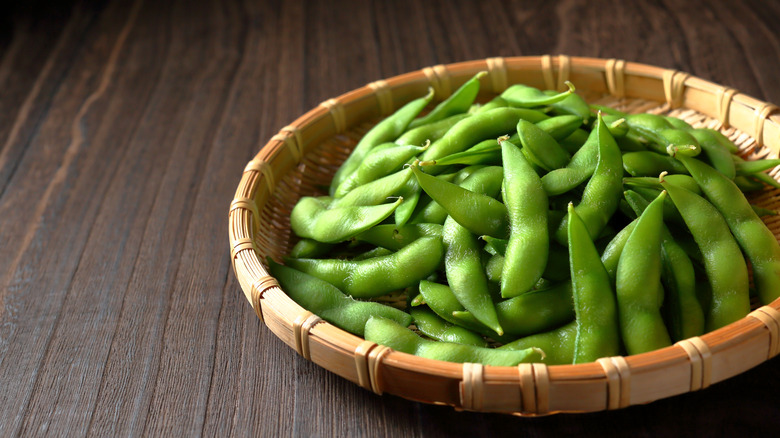Surprising Health Benefits Of Eating Edamame
If you've ever been to an Asian restaurant, you've probably seen edamame on the menu. Edamame is a young soybean that is often served roasted and salted. Here are some health benefits of this food.
Edamame is an excellent plant-based protein source. According to Healthline, one cup of cooked edamame contains 18.5 grams of protein. (While edamame is usually served in the shell at restaurants, only the beans are eaten.) This food also provides all the essential amino acids that your body requires, which does not occur often in plant-based protein sources.
This soybean contains many vitamins and minerals in each bite. It is rich in folate, vitamin K1, thiamine, and riboflavin. It's also a good source of iron, copper, and manganese. According to WebMD, edamame contains 9 grams of fiber in ½ cup, which is the equivalent of 4 slices of whole-wheat bread. While it is high in protein and fiber, it is relatively low in carbohydrates.
Edamame has been linked with lowering certain health risks
According to Medical News Today, soy foods, like edamame, have been shown to reduce the risk of developing certain diseases and conditions. Soy consumption has been suggested to reduce cognitive decline, bad cholesterol levels in the blood, and even the risk of breast and prostate cancer. There are also some studies to suggest that people with type 2 diabetes may benefit from soy products and it may reduce your risk of developing the condition in the first place.
Edamame has grown in popularity over the years and is easy to find. It can commonly be found on the menu at Asian restaurants. If you want to cook it at home, most grocery stores stock edamame in the frozen vegetable section. This soybean has a mild flavor that pairs well with most foods. You can easily mix it into soups or stir-fries for added protein, fiber, and vitamins. It can also be pureed into a spread or eaten plain as a side dish to any meal.


